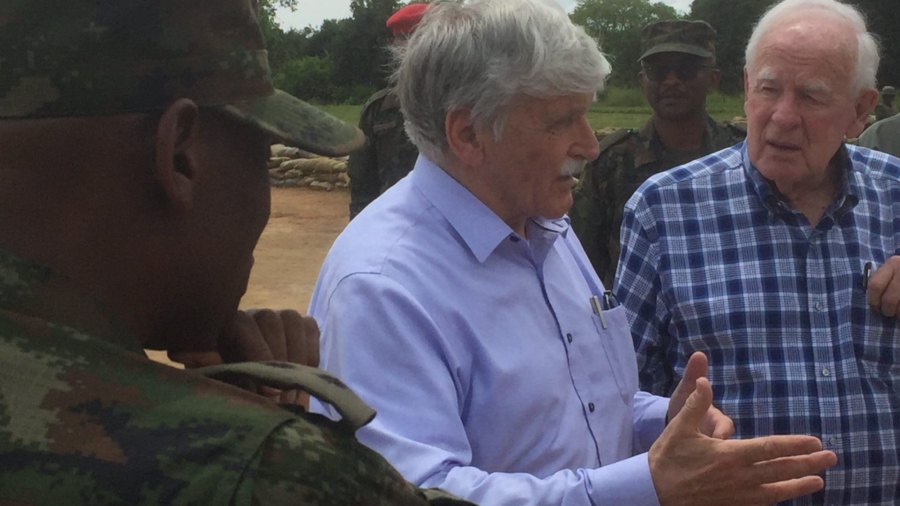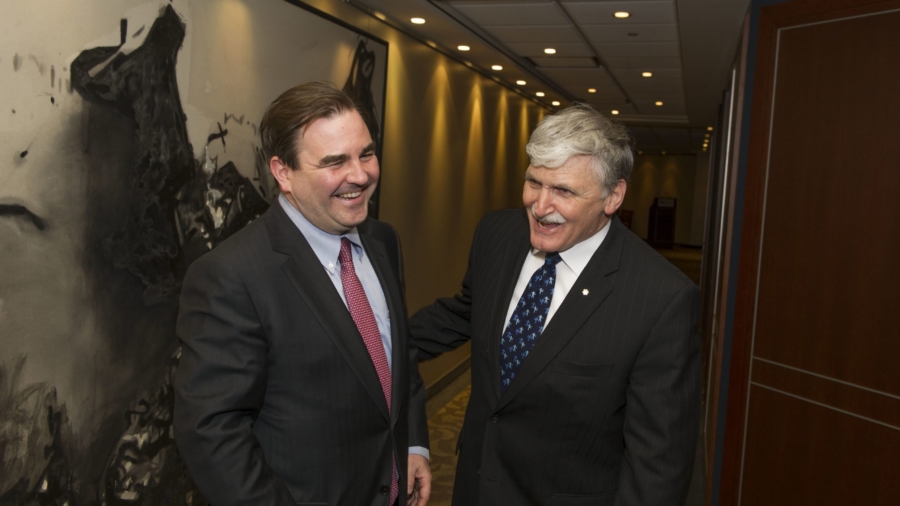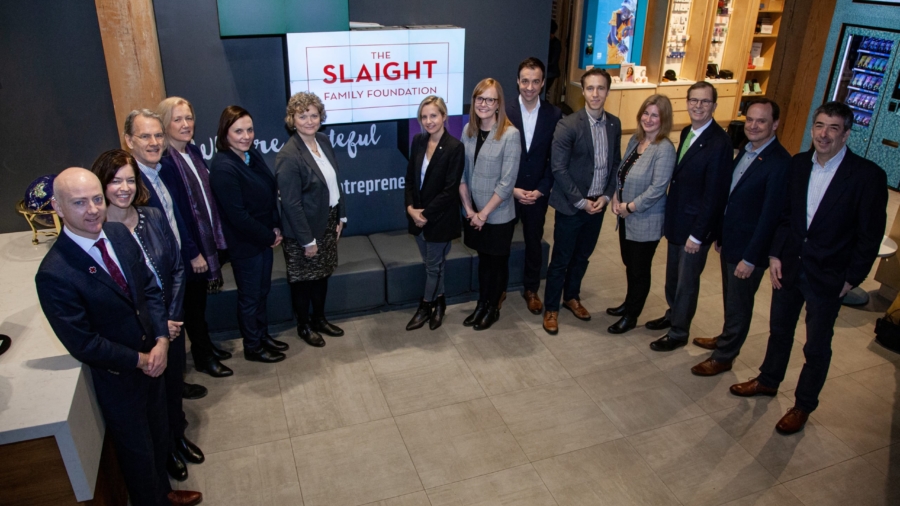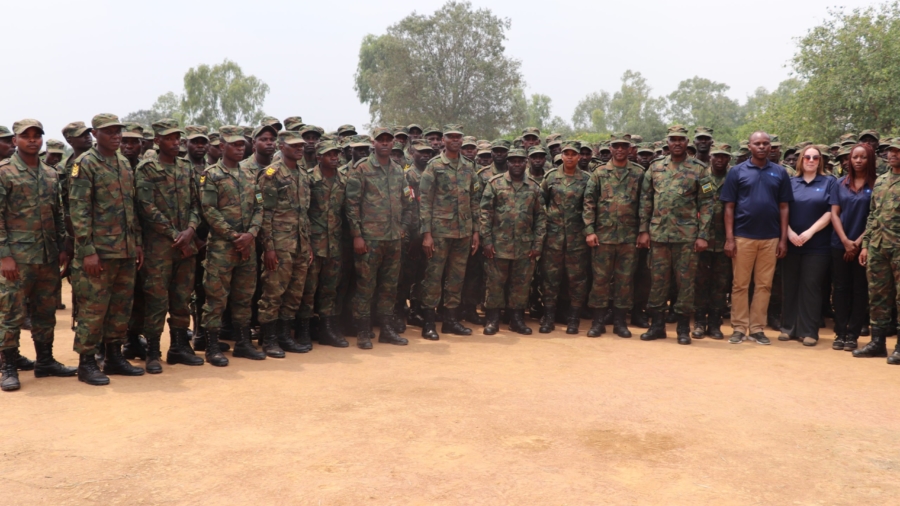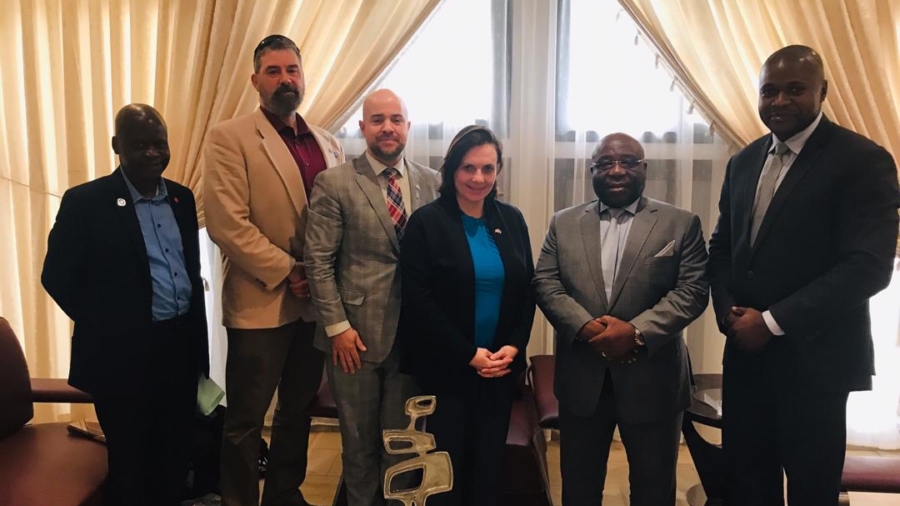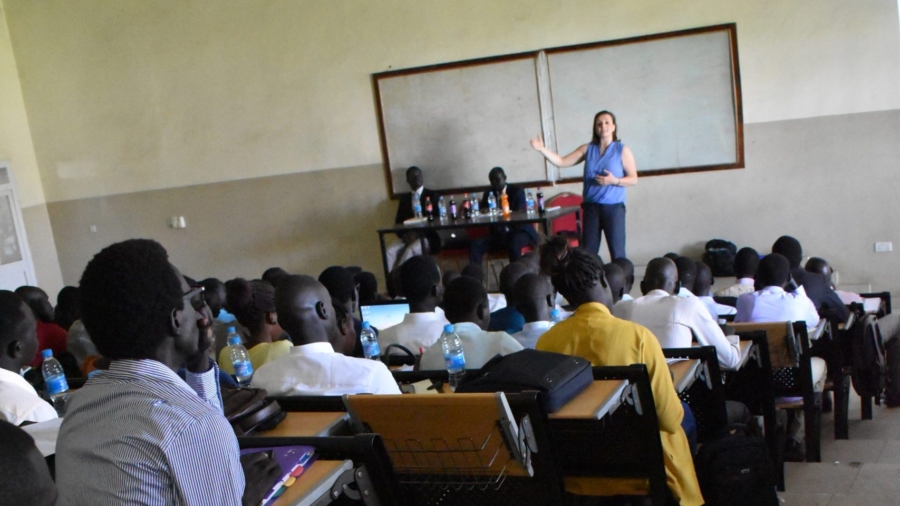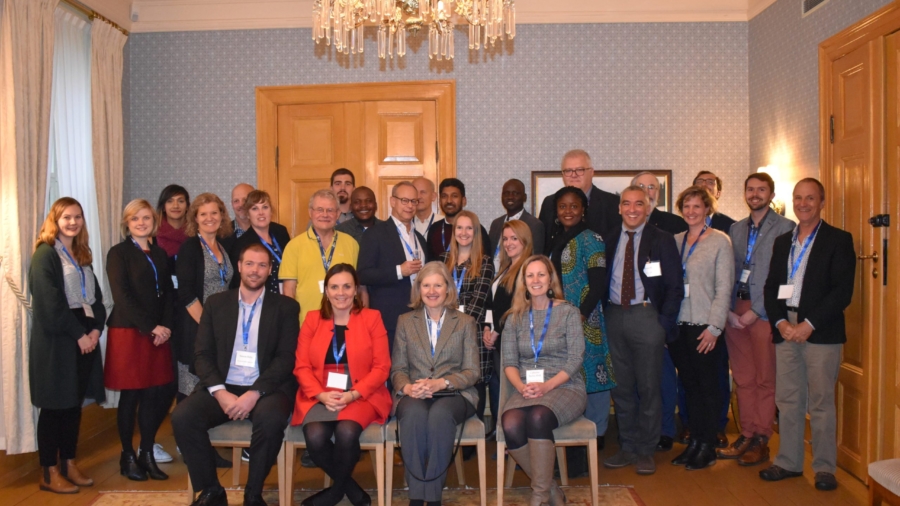Feb 10th Dal News and the Coast
Supporter Spotlight: Jim Stanford
Long-time friend and donor to the Dallaire Initiative, Jim Stanford, recently made a substantial personal commitment that will support our work for many years to come. His enduring partnership with the Dallaire Initiative through the Founders Fund has been critical to keeping our operations going and allows us the flexibility and freedom to pursue strategic opportunities. Unrestricted gifts like Jim’s have been essential to our progress and enabled our exponential growth over the years. We know this new and generous gift will open up exciting opportunities for us and are deeply grateful to Jim for helping us make the recruitment and use of child soldiers unthinkable.
(PHOTO) General Dallaire and Jim Stanford together in Rwanda in 2018
Molson Foundation Funding
From 2015-2018, the Molson Foundation’s supported the Dallaire Initiative’s pilot project called “Building Connections,” which laid the groundwork for a unique approach to addressing child and youth radicalization in Canada.
The project established partnerships across the country with various municipal and regional Police Departments and civil society organizations, to better respond to and prevent violent groups from targeting vulnerable children and youth in Canada. This ground-breaking work resulted in innovations such as the Hexagon Training Tool, online courses, and training workshops that all combined supports multi-stakeholder approaches to understanding and preventing radicalization leading to violence. The Hexagon tool and training has attracted interest and requests from across Canada and internationally. The Dallaire Initiative is proud of the impact we have had on addressing this complex issue, and we continue to identify opportunities to amplify our impact in this space.
In March 2020, the Molson Foundation generously invested another $100,000 in the Dallaire Initiative for a project called Capacity Building for Preventing the Recruitment and Use of Children in Violent Contexts, which will run for two years, in 2020 and 2021. This project will help strengthen our key collaborations with police services and enhance our impact through this combination of our unique expertise and set of training tools.
(PHOTO) Andrew Molson and General Dallaire
$1 million in funding from the Slaight Family Foundation
To mark International Women’s Day, on March 8th, The Slaight Family Foundation contributed $15 million to 15 global organizations working to improve human rights for women and girls. We are among 15 organizations that recently received $1,000,000 funding from the Slaight Family Foundation for a project what focuses on helping reduce child soldier recruitment and conflict- based sexual violence and we are the only organization in the East Coast that received this funding.
“The aim of this gift is to improve conditions for women and girls living in difficult circumstances, who represent some of the world’s most vulnerable populations,” said Gary Slaight of The Slaight Family Foundation.
“The projects we are funding will leverage the expertise of these vital organizations to protect women and girls in the most fragile countries from direct harm, rebuild the lives of those who have been unjustly affected by conflict, deprivation and disease and give them the tools and support they need to survive and thrive.”
Thanks to this generous support, the Dallaire Initiative will continue its work in helping to reduce child soldier recruitment and conflict-based sexual violence through capacity building of national military and police forces, with a focus on female force members; enhance the Dallaire Initiative’s cadre of female international trainers and global champions and raise awareness amongst the global community on the critical role of women in preventing the recruitment and use of child soldiers.
See the full funding announcement here.
(PHOTO) Dr. Whitman at the Funding announcement in Toronto
Rwanda News
Remote Delivery of Training
Due to the travel and assembly restrictions related to COVID-19, the Dallaire Initiative has come up with a creative approach to our international training. Fortunately, Rwanda already has a robust cadre of Dallaire Initiative trained facilitators on whom we can lean to deliver our training. As this highly skilled and motivated cadre was eager to get started, we only needed to find a way to reinforce and enable their efforts logistically so they could deliver our training packages from start to finish.
Our approach was to leverage technological tools in order to share the most up to date curriculum, briefing packages, and course content with our cadre of Rwandan facilitators. Concurrently, Dallaire Initiative trainers will conduct a series of live, virtual training sessions on what we call ‘Lead Facilitator Training’. This training is not meant to cover the content — as these instructors are already experienced and knowledgeable – but instead the administrative and logistical aspects of running the training, which is normally handled by Dallaire Initiative country office personnel.
We are planning to get these virtual trainings up and running in June 2020.
Rwanda Pre-Deployment and Refresher Trainings - February 2020
Before the office closure in Rwanda due to COVID-19, the team held a Pre-Deployment Training (PDT) from February 10-14, 2020 at the Rwanda Military Academy (RMA) in Gako, Rwanda for the 157 Rwanda Defence Force (RDF) Infantry Battalion deploying to the peacekeeping mission in South Sudan (UNMISS). A Refresher Training was also held from February 6-7, also at RMA Gako. The training was structured with four companies rotating on a two-day training basis in two camps, while a senior class of officers was trained for four days. Officers were given a condensed Dallaire Initiative Basic Course. The training was a mixture of classroom lectures, group/syndicate discussions and tactical scenario interaction exercises, followed by a collective final day of Field Training Exercise (FTX).
Democratic Republic of Congo (DRC)
In late January 2020, a team from the Dallaire Initiative travelled to the Democratic Republic of Congo (DRC) to meet with top government officials: the Ministers of Defense, Interior, Human Rights, Gender and Family, and Youth. While there, the team also met with Members of the Communications Branch of the Forces Armées de la République Démocratique du Congo (FARDC), Centre Supérieur Militaire, Police Nationale Congolaise (PNC), DRC Joint Technical Working Committee on Children and Armed Conflict (CAAC), civil society members, and UN officials (MONUSCO SRSG, Chief IMTC), as well as the Ambassadors of Canada, Switzerland and Belgium. The purpose of the trip was to introduce to various stakeholders the mission, objectives and scope of work of the Dallaire Initiative and advocate for the DRC to endorse the Vancouver Principles (VP).
The outcome of the mission in the DRC was very successful. The DRC government, through its Ministry of Human Rights, expressed in a note verbale its commitment to endorsing the Vancouver Principles. Through various discussions and presentations to high-ranking officials within the security sector, we were also able to establish an agreement for an upcoming collaboration to provide basic training to DRC forces on the prevention of recruitment of use of child as soldiers.
Following discussions with the Training Chief of the Integrated Mission Training Centre (IMTC) in Kinshasa, and the MONUSCO Child Protection Office, the IMTC and the Dallaire Initiative jointly proposed a Child Protection Focal Point Training of Trainer (ToT) Workshop for MONUSCO Military trainers, representatives from IMTC, and the Child Protection Office. The workshop was intended as a full-day familiarization training to showcase key Dallaire Initiative training tools and methods with the intention of opening doors to further training opportunities.
On March 10, 2020, a team of five Dallaire Initiative staff and consultants, representing our Rwanda country office, successfully delivered this training to a mixed class of 13 participants. We very much look forward to building upon this partnership as soon as possible.
(PHOTO) Left to right: Colonel Pierre MAWA, Advisor to the Minister of Defense, George Boyuk, Anthony Di Carlo, Dr. Shelly Whitman, His Excellency Aime Ngoi Mukena, Minister of National Defense and Veterans, Arsene Tshidimu
Announcement- The Dallaire Institute for Children, Peace and Security
We are very pleased to announce that in April 2020, Dalhousie University’s Board of Governors officially approved the establishment of the Dallaire Institute for Children, Peace and Security. The Dallaire Initiative hopes to formally announce and celebrate this change in name and status with partners, friends and supporters in Fall 2020.
The newly-established Institute will seek to deepen collaborations with three main faculties at Dalhousie — Arts and Social Sciences, Health and the School of Law — in addition to establishing a Certificate in Children, Peace and Security, a Dalhousie research network and working group, as well as increasing our capacity to conduct guest lectures and partner on research proposals and grants in order to conduct mutually reinforcing, complementary, and groundbreaking research. This work will extend to deepening our connections to post-secondary and research institutions around the world, especially in our countries of operation.
The Dallaire Institute will continue pushing forward with our important work to prevent the recruitment and use of child soldiers through practical, prevention-oriented training with the security sector in numerous countries around the world, from our three locations in Halifax, Juba and Kigali.
(PHOTO) Dr. Shelly Whitman, Executive Director of the Dallaire Institute, provides a lecture on International Humanitarian Law to senior-year law students at the University of Juba (June 2019).

